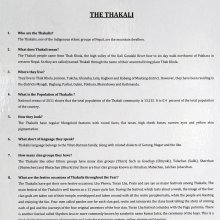Phu, Phū: 6 definitions
Introduction:
Phu means something in Hinduism, Sanskrit, Marathi. If you want to know the exact meaning, history, etymology or English translation of this term then check out the descriptions on this page. Add your comment or reference to a book if you want to contribute to this summary article.
Images (photo gallery)
Languages of India and abroad
Marathi-English dictionary
Source: DDSA: The Molesworth Marathi and English Dictionaryphū (फू) [or फूं, phūṃ].—interj Pooh! pshaw! 2 ad Imit. of the hissing or puffing (of a snake &c.) phū uḍaviṇēṃ (To blow up with a phū or puff.) To treat lightly; to make nothing of. phūṃ paḍaṇēṃ-hōṇēṃ To be puffing and blowing (under fever &c.) 2 To snort--a horse. phūṃ karaṇēṃ-uḍaviṇēṃ To devour, squander, or consume utterly. phūṃ hōṇēṃ To be devoured, dissipated, given to the winds. 2 To sit swelling and heaving in high dudgeon: also to be puffed up with pride. phūṃ hōṇēṃ -bharaṇēṃ -bharūna cālaṇēṃ To roll roaringly along--a full river.
Source: DDSA: The Aryabhusan school dictionary, Marathi-Englishphū (फू) [or phūṃ, or फूं].—interj Pooh! pshaw! ad Imit. of the hissing or puffing (of a snake &c.). phū uḍaviṇēṃ To treat lightly.
Marathi is an Indo-European language having over 70 million native speakers people in (predominantly) Maharashtra India. Marathi, like many other Indo-Aryan languages, evolved from early forms of Prakrit, which itself is a subset of Sanskrit, one of the most ancient languages of the world.
Sanskrit dictionary
Source: DDSA: The practical Sanskrit-English dictionaryPhu (फु).—
1) A magical formula.
2) An idle talk.
Derivable forms: phuḥ (फुः).
Source: Cologne Digital Sanskrit Dictionaries: Monier-Williams Sanskrit-English Dictionary1) Phu (फु):—m. a magical formula, [cf. Lexicographers, esp. such as amarasiṃha, halāyudha, hemacandra, etc.]
2) useless or idle talk, [cf. Lexicographers, esp. such as amarasiṃha, halāyudha, hemacandra, etc.]
[Sanskrit to German]
Sanskrit, also spelled संस्कृतम् (saṃskṛtam), is an ancient language of India commonly seen as the grandmother of the Indo-European language family (even English!). Closely allied with Prakrit and Pali, Sanskrit is more exhaustive in both grammar and terms and has the most extensive collection of literature in the world, greatly surpassing its sister-languages Greek and Latin.
See also (Relevant definitions)
Starts with (+682): Phooldaan, Phu dung, Phu-ak, Phu-Kara-Kana-Dishim, Phuak, Phuangphi-daeng, Phuarchhum, Phuca, Phucca, Phuccaphucci, Phucce, Phucchafuchi, Phuccho, Phucci, Phucco, Phuce, Phuchuna, Phuci, Phuck mon, Phuco.
Ends with (+34): A-aphu, Apasphu, Aphu, Arphu, Barataraphu, Baratarphu, Barphu, Bharatarphu, Bolphu, Cautaraphu, Damphu, Danephu, Daphu, Dieng-ta-tymphu, Drimphu, Drinphu, Galephu, Gamjiphu, Gapphu, Golphu.
Full-text (+28): Phutkara, Phutkrita, Aphusati, Thua phum, Phusati, Phupavanem, Phu-Kara-Kana-Dishim, Phut, Samphusati, Phisharanem, Phisakara, A phu dung, Phisharaki, Phu dung, Phisakaranem, Phisaphisanem, Phisharakhora, Phishari, Phasa-na-phusa, Tamyae tua phu.
Relevant text
Search found 15 books and stories containing Phu, Phū; (plurals include: Phus, Phūs). You can also click to the full overview containing English textual excerpts. Below are direct links for the most relevant articles:
The Fo-Sho-Hing-Tsan-King (A Life of Buddha) (by Samuel Beal)
The Practice Manual of Noble Tārā Kurukullā (by Dharmachakra Translation Committee)
Buddhist Education in Thailand (critical study) (by Smitthai Aphiwatamonkul)
6.3. Dhonburi Period < [Chapter 2 - The Thai Sangha System of Education]
Blue Annals (deb-ther sngon-po) (by George N. Roerich)
Chapter 20 - Trophupa (iv): Khro phu lo tsa ba’s Disciples < [Book 8 - The famous Dakpo Kagyü (traditions)]
Chapter 20 - Trophupa (iii): Khro phu lo tsa ba < [Book 8 - The famous Dakpo Kagyü (traditions)]
Chapter 3b - The Life story of 'Khon phu ba < [Book 4 - New Traditions of Secret Mantra]
Lankavatara Sutra (by Daisetz Teitaro Suzuki)
Tibet (Myth, Religion and History) (by Tsewang Gyalpo Arya)
5. Buddhist Schools and the Politics of Tibet < [Chapter 7 - Buddhism in Tibet]
Related products

